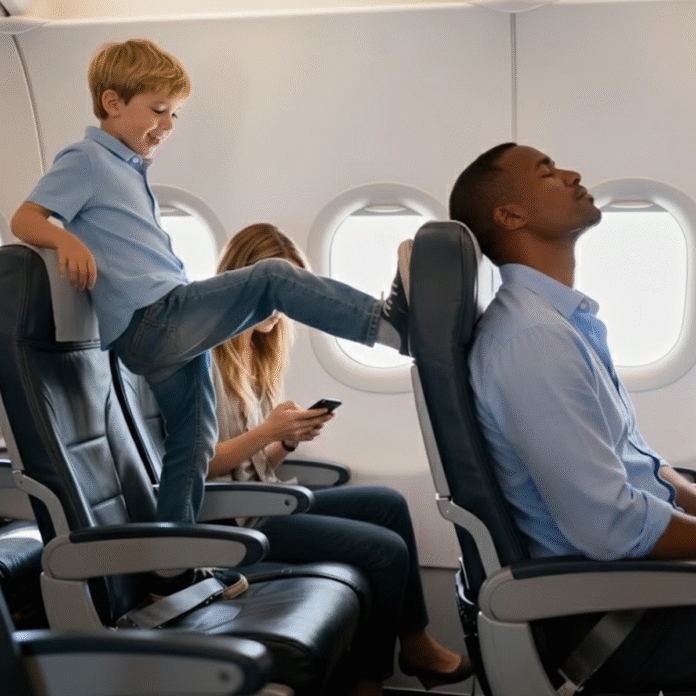It began like any other work trip—crowded terminals, long lines, and the quiet exhaustion that comes from living out of a suitcase. I had been traveling for nearly twelve hours, and by the time I reached my final flight home, peace was the only thing I wanted. Six uninterrupted hours between the clouds—that was the dream.
The cabin lights dimmed as we taxied toward the runway. I found my seat, buckled in, closed my eyes, and let out a long sigh of relief. The hum of the engines was almost comforting. Maybe, finally, I could rest.
But peace had other plans.
The Kicks That Wouldn’t Stop
At first, it was harmless chatter—the kind that fills airplanes before takeoff. But one voice stood out, bright and bursting with energy. Behind me, a little boy peppered his mother with a steady stream of questions.
“Why do airplanes go so high?”
“Can clouds touch each other?”
“Do pilots ever get lost?”
His enthusiasm was impressive, but his volume was… considerable. I smiled at first, remembering my own children’s early curiosity, but fatigue quickly replaced amusement. My eyes shut tighter, hoping for quiet. That’s when I felt it—the first kick.
A light tap on the back of my seat. Then another. Then another. Rhythmic. Relentless.
I turned around, polite but firm. “Hey there, buddy, could you try not to kick the seat? I’m really tired.”
His mother gave me an apologetic smile. “I’m so sorry. He’s just excited—it’s his first flight.”
“No problem,” I said, forcing a kind tone. But five minutes later, the gentle tapping became thudding.
The exhaustion that had been simmering for hours turned to frustration. I closed my eyes again, trying deep breathing and calm thoughts, but every jolt of my seat erased the effort.
Eventually, I turned again—less patient this time. “Ma’am, please. I’ve had a long day. Could you ask him to stop?”
She tried. I could see the fatigue in her eyes, too. But the boy’s excitement was stronger than her words. The flight attendant even stopped by to remind them gently that other passengers were trying to rest. Nothing worked. The kicks kept coming, and my patience began to crumble.
The Moment I Could Have Lost My Temper
I could feel that familiar tightness in my chest—the one that comes when you’re seconds away from snapping. But just as I was about to say something sharp, a quieter thought slipped in: Maybe there’s another way to handle this.
I unbuckled my seatbelt, stood, and turned around. The boy froze mid-kick, his eyes wide. He wasn’t scared—he was curious.
I knelt beside his seat. “Hey, buddy,” I said softly. “You really like airplanes, don’t you?”
He nodded, smiling. “Yeah! I want to be a pilot one day! This is my first time flying!”
And in that instant, my frustration melted into understanding. He wasn’t trying to be rude. He wasn’t trying to ruin my peace. He was excited—overwhelmed by wonder. The same kind of wonder most of us forget as adults.
A Change in Approach
“Well,” I said, “I think that’s a great dream. You know, I can tell you a few things about how planes work if you’d like.”
The boy’s face lit up. “Really?”
I explained how the engines push air backward so the plane can move forward, how the wings create lift, and why the plane tilts when turning. His eyes grew wider with every answer.
The kicks stopped completely. In their place came thoughtful questions. Real ones. “How do pilots talk to each other? What’s the tallest cloud you’ve ever seen?”
For the first time that day, I smiled without effort. The noise that had annoyed me moments before had transformed into connection.
When the flight attendant came by, I asked if the boy could visit the cockpit after we landed. She smiled and promised to check with the captain.
The Lesson at 30,000 Feet
Two hours later, the plane touched down smoothly. The captain emerged from the cockpit and invited the boy to come up front for a quick look. His mother’s eyes filled with tears as she whispered to me, “No one’s ever done something like this for him.”
The boy looked back at me, a shy grin spreading across his face. “Thank you,” he said softly.
And that’s when it hit me.
I had boarded that flight consumed by my own exhaustion. I wanted quiet, solitude, and control. But that boy reminded me of something I hadn’t felt in a long time—the awe of first experiences.
The first flight.
The first big dream.
The first moment someone believes in you, even when you’re a stranger at 30,000 feet.
That flight reminded me that sometimes, what looks like irritation is really just a plea for attention—or connection. And that kindness, even the small, tired kind, can transform a difficult situation into something unexpectedly beautiful.
The Next Trip
A few weeks later, I found myself boarding another flight. Different destination, same crowded cabin. This time, when a small pair of sneakers began to drum gently on the back of my seat, I didn’t sigh or roll my eyes.
Instead, I turned around, smiled, and asked, “Are you excited about flying?”
The boy nodded. His mother smiled back, relieved.
And just like that, the mood shifted—from tension to joy, from annoyance to understanding.
What That Flight Taught Me
We live in a world that often rewards quick tempers and short patience. But that evening, somewhere above the clouds, I learned that empathy travels farther than frustration ever could.
Children don’t remember who lost their temper. They remember who listened, who smiled, who gave them something to dream about.
And maybe, if we’re lucky, those of us who have forgotten the wonder of being small and curious can borrow a bit of it back—from a restless seven-year-old who just wanted to fly.
Because sometimes, the smallest gestures—a smile, a kind word, a few minutes of attention—can turn turbulence into something unforgettable.



